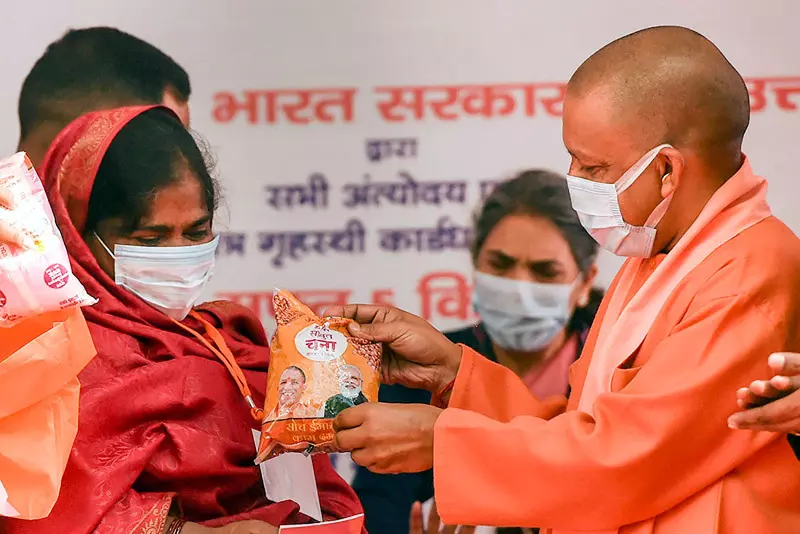
BJP's winning factor in UP: Was it overwhelming 'Hindutva' or 'Modi magic'
text_fieldsLUCKNOW: The ruling Bhartiya Janata Party (BJP) has finally re-written history in the country's most populous state of Uttar Pradesh, whereas incumbent political party has been voted back to power in succession after a gap of nearly four decades.
But who gets the credit for such a spectacular victory – is it the magic of prime minister Narendra Modi or the overwhelming aura of 'Hindutva' , systematically spread by the saffron-clad 'mahant'-turned chief minister Yogi Adityanath ?
Even though the party's win of 260 + out of the state's 403 assembly seats today is relatively lower than the 2017 count of 312 (325 including it allies), it remains a commendable feat. After all, unlike 2017, when the key opposition Samajwadi Party (SP) stood like a badly divided house, this time it emerged as the main challenger to the mighty BJP.
SP chief and former chief minister Akhilesh Yadav, who was busy fighting his own family feud in 2017, rose up to take on the "double engine" power of Narendra Modi and Yogi Adityanath.
While there is no doubt that Akhilesh woke up rather late in the day – barely four months before the electoral battle – he got enthused by the overwhelming response he received. Apparently, the huge turnout at his rallies right from Bundelkhand in Southern UP to the North –Western corner of Saharanpur, as well as from the affluent farmers' belt in the West UP to the poverty-ridden Purvanchal in the East, failed to translate into votes. What apparently further confused observers was the exuberance of the crowds at Akhilesh's rallies even in the Modi bastion of Varanasi as well as Yogi's home-turf. Gorakhpur.
Agitated youth, who were visible in large numbers at most of his rallies, seemed to endorse Akhilesh's cries against increasing unemployment. Issues like price-rise, farmers' year long demonstration against controversial farm laws , or the stray cattle menace , which also found sufficient space in the public discourse, also seemed to have got lost somewhere when it came to pressing the button on the electronic voting machines (EVMs).
Meanwhile, when Akhilesh managed to woo a couple of non-Yadav OBC leaders like Swami Prasad Maurya, Dara Singh Chauhan as well as Dharam Singh Saini, each of whom switched loyalties from BJP to SP, the BJP leadership began to look jittery. Each of them represented separate OBC sections and when they were originally imported into BJP from BSP, they had evoked much excitement. Therefore, their cross-over to SP seemed to make BJP uncomfortable.
What gave Akhilesh more credence was the convergence of the top BJP leadership led by prime minister Modi, who at one point of time virtually took command of the campaign in Purvanchal by camping for three days in Varanasi. When Yogi's pictures suddenly stopped showing on Modi-dominated posters and BJP hoardings even in Gorakhpur, it gave rise to the impression the BJP was losing ground.
As it stands today, it is pretty evident that none of the three leaders actually turned out to really enhance Akhilesh's stock. In fact, Swami Prasad Maurya, who was the most prominent of them, lost his own election. The OBC caste groups the three defectors were believed to be carrying in their pockets did not seem to shift their allegiance. Analysis carried out by key pollsters makes it clearly evident that bulk of these very OBCs voted for the BJP. And what made it worse for the SP was the larger tilt of women OBC voters in favour of BJP.
Since the assessment of these pollsters in the exit polls have turned out to be closer to reality, it can safely be assumed that Contrary to popular belief women voters in general voted in large numbers for the BJP. They happened to be the direct beneficiaries of the prime minister's free ration scheme.. And contrary to the popular belief that women would also get divided on caste lines, this did not happen, largely because as housewives, they happened to be the direct beneficiaries of the prime minister's free ration scheme, that was specially extended up to the current month of March.
What perhaps also contributed to the surge that BJP got in the election was Yogi's 'bulldozer' image, through which he sought to convey his "no-nonsense" hard-task master style of working. However, it cannot be understated that "bulldozer" remained a key part of his utterances all through the campaign. Not only other top BJP leaders, but Yogi himself, made it a point to declare how the "illegally acquired properties of criminals like Mukhtar Ansari and Atique Ahmad" were brought under the bulldozer. Sure enough, the idea behind highlighting these two names on most occasions was to also send the message far and wide that criminals belonging to the minority community were on his target. Similarly, repeated references were also made by him to "Jinnah", "Abba-jaan" and later even 'Hijab", besides of course, "kabristaan and shamshaan", were also not without intent and purpose.
The UP chief minister's echoing claim, spread through advertisements on TV channels and print media, that he had established the rule of law in what he alleged had turned into a "lawless" state under SP rule also paid rich dividends. On the contrary, Akhilesh failed to effectively counter this systematic narrative, which allowed the common perception about SP to prevail. His effort to build the impression that he was trying to create a "new Samajwadi Party" through his "nai hawa , nai sapa" campaign remained quire feeble and unconvincing.
At the end of the day, Akhilesh's propaganda machinery was not half as well-equipped or as efficient to match the ruling BJP's means and resources that were put to use to bombard people with their narrative.











